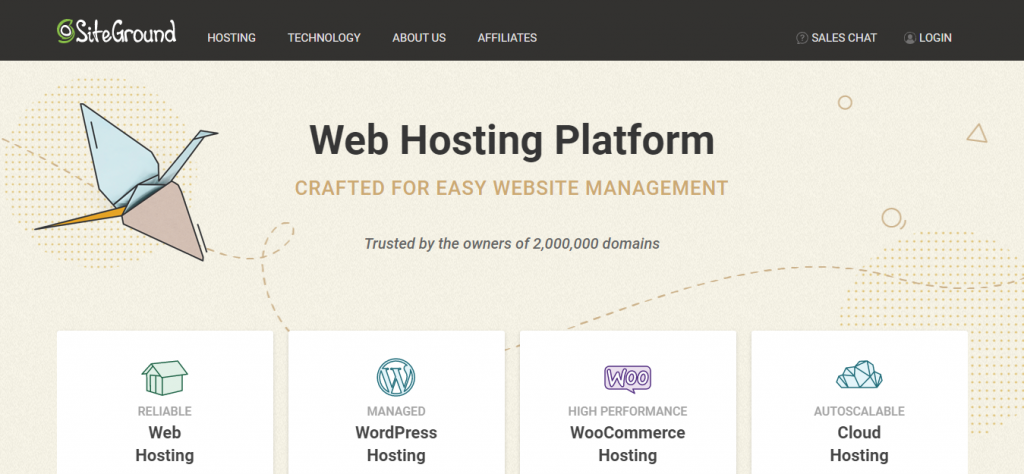Cheap Replica Watches We Sell The Best AAA Swiss Luxury Fake Watches for the Best Place for Rolex Replica Website. Shop Now!
Get Best Quality rolex replica watches Men Discount,Free Shipping And Return!
Cheap Swiss Breitling replica shop offers high-end Bentley, Endurance Pro, Navitimer and Colt Skyracer.
Good running website always demands a lot when it comes to web hosting. People still want to go with a reliable one. However, things can go beyond expectations when there is high competition in the market. At times, it becomes a hassle to choose one. So, it ends up being a big frustrating task.
Here you can find a detailed comparison between BlueHost and SiteGround, the two most prominent companies in the web hosting industry. Let’s explore which one is better, and why.
Bluehost and SiteGround – A Brief History
When it comes down to the best web hosting services, Bluehost stands as a leading one. In 2003, Matt Heaton and Danny Ashworth initiated the service. Back then, it was a little idea with a limited number of people. In those times, the host used CPU throttling but that had a downtime of several hours. The significant change began after the Endurance International Group acquired Bluehost in 2011.
Since then, the company started to grow. Now, it has an operating facility of over 50,000 Square Feet land. This facility is in Orem, Utah, and is currently operated by 750+ people.
On the flip side, SiteGround is also known for its best domain services. In 2004, a group of university friends, including Ivo Tenon in Sofia, Bulgaria, decided to initiate this project. The venture started off great. Eventually, Joomla partnered with SiteGround to offer free hosted website solutions. This skyrocketed SiteGround and began its successful journey. The company expanded over 6 countries around the world. It now has 6 data centers across the US, Netherlands, the UK, Germany, Australia, and Singapore. The privately held company enjoys more than 500 employees right now.
Detailed Comparison Between BlueHost and SiteGround – Top 9 Features
It is human nature to demand more of everything. Just as choosing a place to live and deciding what to eat, we are always nitpicking. Consequently, in the world of technology, it also remains the same. People want more features and reliability at less price. These companies, in turn, are looking over, generating, and hosting their websites. However, not everyone finds a fair deal.
Web hosting services with full features are in demand for a reason. It makes life easier for any website owner. Comparing to the top 30, Bluehost and SiteGround are the best choices and top competitors in the market. Nevertheless, they are paving their way with innovation. However, if you are still struggling to choose the perfect service, readout below, the detailed comparison between Bluehost and SiteGround. Eventually, it will make your life hassle-free.
Check out the features and see what suits you the best!
1. User Friendliness (Comparison Between Bluehost and SiteGround as a Newbie)
The very first step of assessing a web host service is their User Interface friendliness. Complexed processes and detailed forms can frustrate anyone. Besides, not everyone is a master in technological terms and jargon. So, the better user-friendliness, the better the customer range.
Comparison between Bluehost and SiteGround proves that both have easy to use features. Bluehost Control panel layout is easier to understand and navigate. Yet, it also offers advanced features for people who know their way around. A beginner can smoothly go through cPanel and access Apps. It is initially designed for beginners and people who do not like distractions. For example, you can just install WordPress with 1-click.
However, many opponents claim that cPanel can become irritating. The constant upsell of paid tools can be confusing because you are more likely not to use them.
Whereas SiteGround offers a little for everyone. It has a Beginner to Advanced feature. If you are a beginner or a website developer, you can access Apps on it. The bigger plans also have Pre-installed Git. Thus, SiteGround has a lot more potential for every user despite unfamiliarity.
2. Pricing
People always assume low price means low quality. However, Bluehost marks an exception in this case. The web host service has low introductory prices. When compared to SiteGround, it also has a low renewal price. A bit of advice, don’t go for cheaper hosting when you have high expectations for websites.
Both hosts offer basic to premium plans. In Bluehost, four plans are Starting from Basic to Pro. All of them share similar features except for basic. The only difference with bigger plans is performance. The most recommended plan is the choice plus.
For SiteGround, the service plans are Startup, Growbig, and GoGeek. The website and storage increase gradually with the plan. However, they also offer selected features on each plan. Likewise, in the GoGeek plan, they offer Git, stagging, and other developing features.
3. Load Speed
The most frustrating thing for the android or pc user is the load speed. Users tend to leave the website if it takes more than 3 seconds to load. People lack patience and want quick responses. So, a bad load time remains one of the main concerns. Resultantly, it can cause a decrease in traffic. Perhaps because of this, there will be low sales too. In 2018, a google survey showed that 53% of people would eventually leave the site in such cases. So, good load time or speed matters most.
Here we have two market competitors: Bluehost and SiteGround. Bluehost stands in the top 5 fastest sites. Whereas the SiteGround stays in the top 10. Practical tests using a third-party tool showed comparative results as follows:
Bluehost tested a load speed of 405ms.
SiteGround tested an average load time of 673ms.
Source: Hostingfacts.com
4. Uptime/Downtime
As a website owner, you always consider the uptime or downtime of the host. A good uptime means you can have your users on the website without any problems. However, if the site faces more downtime to load, the users are likely to shift to another website. So, when considering a web hosting service, uptime/downtime should play an important role.
When we talk about the Bluehost service, the average uptime through a year is 99.99%. So, if we count over days, it will be around 0.0365 days. This, we suppose, nobody will go against the idea. Besides, it seems to be the most reliable uptime as well.
On the other hand, SiteGround also provides 99.99% average uptime. Both of the services mark their achievement in this regard.
Below is the 12-month Breakdown journey of Bluehost and SiteGround.
| Month | BlueHost | SiteGround |
| Feb 2019 | 100% | 100% |
| March 2019 | 99.99% | 99.99% |
| April 2019 | 100% | 100% |
| May 2019 | 100% | 99.98% |
| June 2019 | 99.98% | 99.99% |
| July 2019 | 100% | 99.98% |
| August 2019 | 99.99% | 99.99% |
| September 2019 | 99.99% | 99.99% |
| October 2019 | 99.96% | 100% |
| November 2019 | 100% | 100% |
| December 2019 | 100% | 100% |
| January 2020 | 100% | 99.92% |
| Average Uptime | 99.99% | 99.99% |
Source: Hostingfacts.com
Additionally, high uptime is good for website performance. It keeps the user intact and causes no issues. However, considering the average, it is still hard to decide between the two.
5. Data security
Data leak or insecurity is the worst nightwear of every web user or website owner. Especially when you are hosting your web over a domain. SiteGround and Bluehost both come with SFTP, SSL, and SSH. However, SiteGround also uses PHP 7, which is a more secure version. It monitors the traffic, blocks force attacks, and updates security rules every week. Such security is essential for a good website.
Besides, SiteGround also offers a malware SG Site Scanner. It scans the site and is pocket friendly. It costs only $1.50 per month.
On the other hand, Bluehost offers an external site lock. It is also pocket friendly as it cost $30 per year.
6. WordPress and Other App Integration
Globally, WordPress is the most commonly used content management system. Across the platform, 75% of websites use WordPress. Whether it is a personal blog or news magazine, it covers most of them. With so much activity, people always rely on easily manageable tools. Also, they seek to optimize productivity. Considering both competitors, you can easily manage your WP with them. However, Siteground offers more than Bluehost in regards.
Here’s an evaluation.
| WordPress | Bluehost | Siteground |
| Easy installation | YES | YES |
| Auto system updates | YES | NO |
| Auto Plugin update | YES | NO |
| In-house cache | YES (SuperCacher) | Need to install a plugin |
| Staging area | YES (Growbig and GoGeek Plans) | NO |
7. Customer Support
We always recall customer support in case of any interference. Whether it is a connectivity issue or process information, quick solutions are still worthy. However, even big brands flop because of it. The unmonitored and untrained staff can take more time to respond. Hence, the user can face frustration and end p ditching the services. So, when comparing Bluehost and SiteGround, customer service standards are mostly the same. There is a 24/7 contact option for customers, mainly through live chat or calls. Conversely, Bluehost CS takes longer to respond over live chat. Yet, both the service providers have professional customer support inlined.
8. Money-back Guarantee
Even If you are a beginner, you should face no worries with Bluehost or SiteGround. We believe it might be difficult for people to understand the service by text content. And Still, they would want to obtain user experience. Since both of these are very friendly towards beginners, people can easily have their hands-on experience.
So, how exactly?
Well, the host offers a 30-day money-back guarantee. If you like the product, then carry on. But if you don’t consider it suitable, you can have your money back. Eventually, the offer does not apply to add-on products like Domain Names, Cloud support, etc.
So, If you face a problem, you can cancel it within 1 month. Otherwise, you will only get the remaining amount of hosting terms after 30 days.
A Brief Comparison Between BlueHost and Site Ground – Which One to Choose?
Bluehost and SiteGround both are market competitive web hosting service providers. Both of them are highly demanded and have over 2Million users worldwide. However, certain things may differentiate them from one another. Let’s see a brief comparison between Bluehost and SiteGround.
Considering the basic plan, here is what we get.
| Features | Bluehost | SiteGround |
| Price Per Month | Starting at $6.99/mo and Renewal at $14.99/mo | Starting at $2.95/mo and Renewal at $7.99/mo |
| Emails | unlimited | 5 |
| Webspace | 10 GB | 50 GB |
| Domains | 1 | 1 (also includes 5 parked domains and 25 subdomains) |
| Domain Price | $15.95 | free for 1 year. Renewal requires after. |
| Loading Speed | 673ms | 405ms |
| Hosting Types | WordPress, VPS, Shared | Shared Web hosting |
| SSL Certificate and CDN | Free | Free |
| Site Migration | $30 per site | $150 for 5 sites |
| Bandwidth | Unlimited | Unlimited |
| Hidden Charges | $14.95 setup fee in case of monthly payments of the plan | N/A |
Conclusion
In terms of pricing, Bluehost is cheaper than SiteGround. However, most of the features are the same. When talking about security, SiteGround offers more.
The above, detailed comparison between Bluehost and SiteGround clarifies the significant differences. Both hosts provide the best services to the customer. You can always decide what suits you the best.


